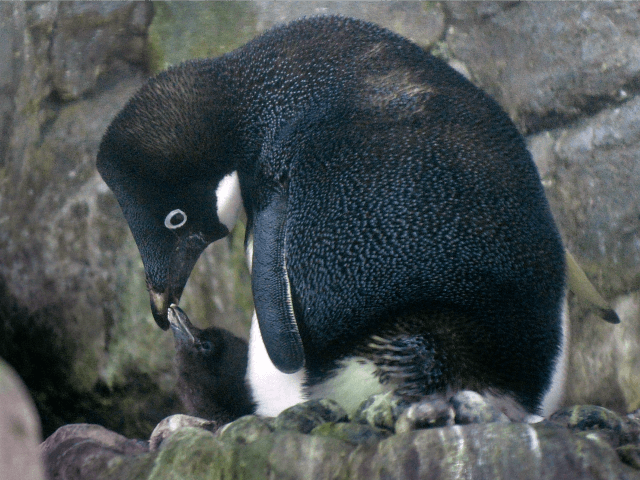Were you moved recently by the tragic tale of 150,000 penguins killed by global warming?
Of course you were. The story was almost inescapable – we even ran a wires version of it here at Breitbart – because it was so irresistible. We like penguins (well, unless perhaps, you’re like me and you happen to consider Happy Feet to be the most satanically evil film ever made, barring Love Actually), we like stories about the frozen majesty of Antarctica (setting for so many heroic, epic adventures from Scott’s and Shackleton’s through to Henry Worsley’s) and there’s always a market for tales of climate disaster prompted by man-made global warming.
That’s why the ‘150,000 penguins killed by global warming’ story went viral. But it is, we now know, complete and utter bollocks. Yet another of those desperate, fabricated bad-things-are-happening-to-nature-and-it’s-all-our-fault yarns foisted on a credulous public by climate scientists to try to justify their increasingly unjustifiable grant funding.
The story was seized on by the usual left-wing suspects, notably Grist which gave it the emotionally charged headline 150,000 penguins have disappeared in Antartica. Thanks, climate change! to imply that somehow man was to blame for the penguins’ plight.
This is because, as the Guardian solemnly told us, an iceberg the “size of Rome” called B09B and somehow created by ‘climate change’ had blocked the route to the feeding area of a colony of Adelie penguins in Commonwealth Bay, forcing them to make a hitherto unnecessary 90 mile round trip to the coast which had caused many of them to die of exhaustion or starvation.
The Guardian article drew 19,000 shares and 1,400 comments, many from tearful Guardian readers lamenting yet another tragic story emblematic of man’s selfishness, greed and unwillingness to change his lifestyle despite the ravages this is clearly wreaking on the world’s vulnerable waddling birdlife.
But as at least one penguin researcher has pleaded from the start, there was never any evidence that these birds were killed by that iceberg. Maybe they just did what wildlife tends to do in situations like this when its habitat is disrupted: move.
“Maybe these birds moved. Maybe they died. There’s multiple scenarios that could’ve happened here,” Dr. Michelle LaRue, a research ecologist at the University of Minnesota, told The Daily Beast. “But nowhere in the paper said there was death and destruction.”
LaRue would know. She did the initial census on the Adélie penguins two years prior to the study done by University of New South Wales researchers that came out early this month.
“I doubt [widespread death and destruction], and the reason I doubt that is that the behavior of Adélie penguins has already been observed in similar circumstances,” she said.
Their migratory patterns were recorded in 2001 after the iceberg B-15 caused them to move, she said.
So whence, pray, did the environmental “penguins-died-and-it’s-all-our-fault” spin on this story emanate?
Step forward Australian climate scientist Professor Chris Turney.
As Paul Homewood has noticed, Turney is the guy who provided the quotes in all the newspapers which led gullible journalists to assume that this was a man-made environmental disaster rather than an unexceptional natural event.
Here’s how he was quoted in the Sydney Morning Herald and other newspapers.
“It’s eerily silent now,” Professor Turney said. “The ones that we saw at Cape Denison were incredibly docile, lethargic, almost unaware of your existence. The ones that are surviving are clearly struggling. They can barely survive themselves, let alone hatch the next generation. We saw lots of dead birds on the ground … it’s just heartbreaking to see.”
As the planet warms you’re going to get more ice melting. The reality is, more icebergs will be released from Antarctica and just embed themselves along the coastline, and make the travelling distances for some of these colonies even further than they have been.”
Adélie penguins usually return to the colony where they hatched and try to return to the same mate and nest. Professor Turney said the Cape Denison penguins could face a grim future. “They don’t migrate,” he said. “They’re stuck there. They’re dying.”
If Professor Chris Turney sounds familiar that’s because you’ve met him before. He was the guy in charge of the infamous 2014 Ship of Fools expedition to Antarctica – the one where a research boat full of tourists, climate scientists and Guardian journalists set sail to the Antarctic to prove the existence of “global warming” and ended up getting stranded in unexpectedly thick ice.
Amazingly this man is still in post as Professor of Climate Change and Earth Sciences at the University of New South Wales where his job is to help us “better understand the causes and impacts of future environmental change.”
Does he not know the meaning of the phrase “dignified silence”? Or indeed: “Study; bottle of whisky; service pistol”?

COMMENTS
Please let us know if you're having issues with commenting.